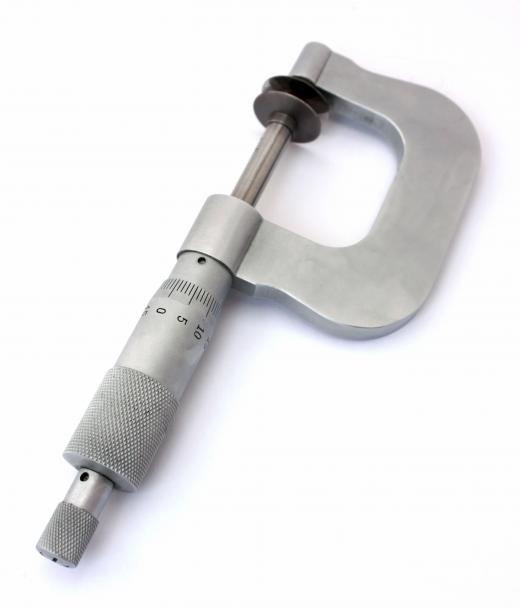A micrometer caliper is a measurement device for finding very exact measurements of an item. These devices are common in many fields, such as mechanical engineering and electronics design. There are three basic forms of this device — outside, inside and depth — and each has its own uses and methods. Outside of these three basic tool types, there are several types with functions specific to a purpose.
A caliper is a measuring device that consists of a two pieces that open and close. The area of the opening may be removed from the item it is measuring and measured itself, allowing non-standard items to have their sizes measured quickly and easily. The micrometer version is essentially a very precise caliper; it measures things to a very tight scale and often features a built-in readout of the size of the measured object.

Most micrometer calipers have their readout right on the handle of the instrument. This typically consists of lines that are uncovered as the caliper opens. In addition to these lines, there may be a secondary scale that measures the fractional areas between the lines of the primary scale.
There are three basic forms. An open caliper measures the outside of an object, such as the head of a screw. An inside caliper measures an opening, like a screw hole, from the inside. A depth caliper will measure the depth of an opening from the bottom to the top. Outside of these three basic styles, several tasks have their own calipers, including those to measure the threads on a screw and aligning materials inside a milling machine.
There are several methods for making a micrometer caliper, but the end result almost always consists of the same collection of parts. The frame contains the handle and the upper jaw. The anvil is on the caliper’s upper jaw and provides a flat and solid surface for a material to rest against. The spindle is the screw that moves up and down on the other side of the anvil — it performs the actual measuring. The sleeve sits at the bottom of the spindle and has the actual readout of the size of the caliper’s opening.
The measurement readout of the caliper on the sleeve is based on the relative position of the spindle. The spindle is on a screw that allows it to move up and down. As the spindle moves, the turning screw creates a mechanical change in the spindle. The spindle separates as the screw retracts and condenses as the screw moves out. This means that the spindle always shows the size of the opening using its own printed scale.
